
14 minute read
Help Us Discover Heroes Rev. Clayton and Rev. Perry
A Call for More COVID-19 Vaccine Funding and Praise for Yale’s Achievements | by Robert Forman
Photo by Harold Shapiro
Advertisement
On July 24, United States Senator Richard Blumenthal (D-CT) highlighted research conducted at Yale School of Medicine and urged his Senate colleagues to approve more federal funding for development and distribution of vaccines to halt the COVID-19 pandemic. Speaking on the school’s Harkness Lawn, Blumenthal said, “Our nation will not go back to anything like normal. We will not reopen our economy, we will not have Americans feeling safe and secure without a vaccine. It’s that simple.” Blumenthal urged passage of a piece of COVID-19 relief legislation called the HEROES act, which, in addition to providing new relief to those hurt economically by the pandemic, would dedicate another $10 billion to moving the nation closer to having safe and effective vaccines. He also praised the science and clinical care taking place at Yale, as well as the university’s efforts to ensure that members of often underserved communities have equal access to both the vaccine development process and the ultimate distribution of vaccines. Nancy J. Brown, MD, the Jean and David W. Wallace Dean of the School of Medicine and C.N.H. Long Professor of Internal Medicine, welcomed Blumenthal and recounted what Yale has accomplished to battle the pandemic. Brown cited unprecedented collaboration within Yale among faculty and leaders with varied areas of expertise, and she noted its positive impact. “Since infection peaked in Connecticut,” Brown pointed out, “we have been, as you know, one of the most successful states in reducing rates of infection. I think that reflects our teamwork.” One promising scientific effort is being led by Richard Bucala, MD, PhD, Waldemar Von Zedtwitz Professor of Medicine (Rheumatology), and professor of pathology and of epidemiology (microbial diseases). When the spread of H1N1 flu reached dangerous levels in 2009, scientists began work on an anti-viral vaccine, but did not have time to perfect it before that epidemic subsided. Bucala is now picking up with COVID-19 where those and other researchers left off. The mechanism of the vaccine he is developing is based on a self-amplifying RNA, which lends itself to being reproduced on a mass scale, and has previously shown promise against viruses. At the news conference, Bucala called it “a platform that can be rapidly developed and easily deployed, so that there can be many vaccinations and no [manufacturing and distribution] bottleneck.” Simultaneously at Yale, Onyema Ogbuagu, MD, associate professor of medicine, is leading Yale’s COVID vaccine clinical trials to help determine the safety and effectiveness of another RNA vaccine, which the pharmaceutical company Pfizer plans to distribute if it gains Food and Drug Administration approval. The phase 3 study’s particular focus is how safe and effective the vaccine would be inclusive of older people and with a focus on equitable enrollment of ethnic and racial minorities. One imperative Yale has as the science progresses is to be sure that all populations have a role in evaluating vaccines, and will have equal access to approved vaccines when that time comes. Saad B. Omer, MBBS, MPH, PhD, director of the Yale Institute for Global Health, noted how “trials that are led by Yale are conducted in some of the most diverse populations in the country.” Diversity is essential, he said, to
have trial results that are generalizable to the populations most impacted by this outbreak. “In the context of vaccines,” Omer explained, “some of the work at Yale, and others’ work as well, has clearly elicited the differential impact of COVID-19, not just by age but by background and socioeconomic status and a Senator Blumenthal with Yale Scientists. Senator Richard Blumenthal praises COVID-19- disproportionate impact on the communities of color.” related work by (l-r, rear) Saad Omer, Ellen Foxman, Akiko Iwasaki, Richard Bucala, and Onyema Ogbuagu. Reverend Dr. Leroy O. Perry, Jr., pastor of St. Stephens AME Zion Church in Branford, has played a primary role in connecting Yale scientists with greater New Haven’s African American community. Perry’s role as a Cultural Ambassador has included explaining to members of his community why volunteering for clinical trials will benefit them. A Greeting from the Dean. Dean Nancy J. Brown welcomes Senator Richard Blumenthal to Yale School of Medicine.
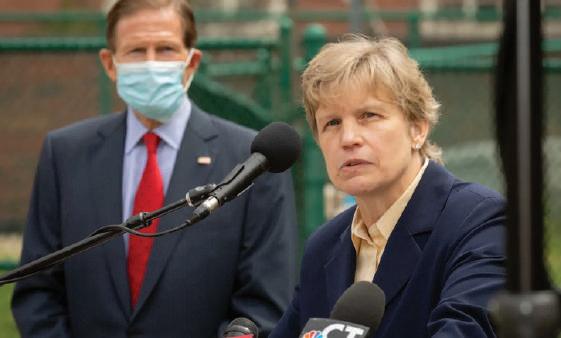
Photo by Harold Shapiro
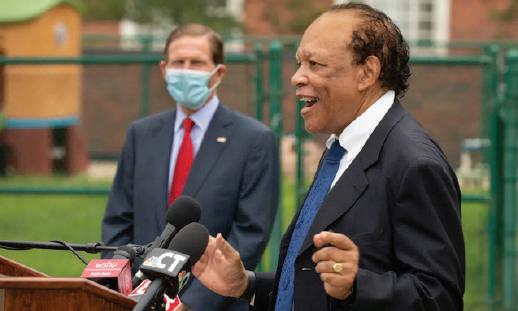
Photo by Harold Shapiro
Highlighting Minorities’ Participation. Rev. Dr. Perry, describes the need for Yale and communities of color to battle COVID-19 together.
– Rev. Dr. Perry
Over the past decade, Cultural Ambassadors have worked closely with Yale researchers, listening to and evaluating research proposals while advising Yale scientists on how best to shape their studies so they will be well received in the community. All agreed this collaboration may never be more essential than during the COVID-19 emergency. Also highlighted by Dean Brown at the session was the work of Akiko Iwasaki, PhD, Waldemar Von Zedtwitz Professor of Immunobiology and professor of molecular, cellular, and developmental biology, who is studying how some aspects of the body’s immune response might lessen the effects of COVID-19, while some might exacerbate them – as well as that of Ellen F. Foxman, MD, PhD, assistant professor of laboratory medicine and immunobiology, whose efforts have included enhancing tools to diagnose COVID-19.
Have You Gotten Your COVID-19 Vaccine?
Healthy & Wise (September 2021), published by YNHHS Marketing and Communications
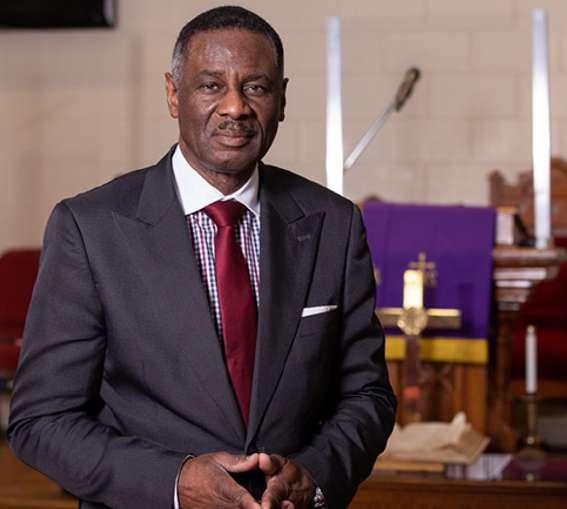
Rev. Clayton of Walter’s Memorial AME Zion Church in Bridgeport participated in the clinical trial for the Pfizer COVID-19 vaccine, attests to the vaccine’s safety and urges everyone to get vaccinated.
Misconceptions about the coronavirus and vaccination persist as we mark the 18th month of a pandemic that has infected more than 34 million people in the U.S. and claimed over 610,000 American lives. Many of those who recover experience ongoing health issues – even if they didn’t require hospitalization. “There is a misconception that just older people or those with underlying conditions suffer complications from COVID-19, but that is simply not true”, said John-Ross Clarke, MD, chief medical resident, Bridgeport Hospital. “The virus can have effects in people who were asymptomatic (never had symptoms) and didn’t know they had the virus. I have particularly seen this in young people.” Vaccination is the way forward in returning to normal, Dr. Clarke explained. “Especially with new variants that are circulating in Connecticut, the more people who get vaccinated, the more people who will be protected against these more contagious strains.” All three vaccines approved for emergency use by the U.S. Food and Drug Administration are highly effective at preventing severe illness from all variants of COVID-19 that have been identified in the state.
Reverend Elvin Clayton knows the importance of vaccination during a pandemic. The pastor of Walter’s Memorial AME Zion Church in Bridgeport encourages as many people as possible to get a COVID-19 vaccine.
“This is what we all have to do to beat this thing,” he said. “The best and fastest way to get there is for all of us to get vaccinated.”
One common misconception is that the COVID-19 vaccines were “rushed” and not vetted properly. Not true, says Gregory Buller, MD, associate chief medical officer and chair of medicine, Bridgeport Hospital. “Researchers spent years developing the technology that would make these vaccines possible,” he said. “When called upon for an inoculation specifically for COVID-19, the manufacturers created their vaccines and studied them with the same rigor as others. Yale New Haven Health participated in the final phase, Phase 3, of the Pfizer vaccine’s clinical trial, so we saw first-hand the thoroughness of the study.” Reverend Clayton was a participant in the Phase 3 clinical trial, in which participants didn’t know if they receive the vaccine or a placebo. As a Cultural Ambassador for the Yale School of Medicine, he understands the importance of including people of different ethnic backgrounds as clinical trial participants. The Cultural Ambassadors program educates leaders of New Haven’s African American and Latino populations about clinical trials.
“I made up my mind early on that I would be a part of the COVID-19 study because I thought it was a necessary thing, especially for people of color,” he said. “I didn’t have any doubts because I knew the scientists behind the vaccine study were putting everything they had into making it safe and effective.” Reverend Clayton wondered if he received the placebo during the clinical trial because he didn’t experience any side effects. When Pfizer released the results of the study months later, he discovered he was one of the participants who received the vaccine.
Even after telling people about his experience in the Pfizer trial and sharing vaccine facts, Reverend Clayton says some people are still hesitant. He understands, and offers some advice: “Listen to the scientists. Have a conversation with your doctor and look at the number of people this disease has taken from us,” he said. “I am a pastor, not a doctor, but in my opinion, you have two choices – get the vaccine or get the virus. I think our choice should be to get the vaccine.” To learn more about the COVID-19 vaccine, visit bridgeporthospital.org.
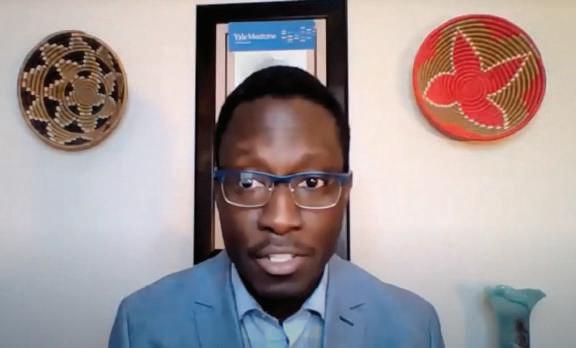
Onyema Ogbuagu, MBBCh, FACP, FIDSA explained the development of the authorized COVID-19 vaccines.
African-American and Latino communities are three times more likely to be hospitalized for COVID-19, and are twice as likely to die from it. These are facts, but there also is a great deal of inaccurate information online and in the media about COVID-19 and the vaccines that are designed to fight it. To help dispel some of the misinformation, a panel of Yale experts participated in a webinar on March 3, 2021 which answered questions from the public, addressing their concerns and underlining the importance of vaccination in the African American and Latino communities. Nancy J. Brown, MD, Jean and David W. Wallace Dean and C.N.H. Long Professor of Internal Medicine, served as moderator and guided the discussion of an expert panel both from Yale and the federal government. The webinar was hosted by the Yale Center for Clinical Investigation (YCCI), which facilitates the conduct of clinical research at Yale with support from the federal Clinical and Translational Science Awards (CTSA) program, and representatives from its Cultural Ambassadors Program. The program is a bidirectional effort between YCCI and YSM to improve minority participation in clinical trials, which has been historically low. Much of this is due to a mistrust of the medical establishment within minority communities. “Cultural Ambassadors acknowledge past issues in research,” said Tesheia Harris, Associate Director for Clinical Research for YSM and deputy director and chief operating officer of YCCI. “Tuskegee did happen. Henrietta Lacks did happen. But one of the important messages is that regulatory change happened as [a result] of that mistrust.” Cultural Ambassadors alert people about opportunities to participate in research safely that may not only benefit their own health, but the health of their communities.
Two Cultural Ambassadors, Reverend Dr. Leroy O. Perry, Jr., pastor of St. Stephens AME Zion Church in Branford, and Reverend Elvin Clayton, pastor of Walter’s Memorial AME Zion Church in Bridgeport, both participated in the clinical trial for the Pfizer BioNTech vaccine in August. “We participated in the clinical trial so that we could say to our communities that this is an important step for all of us,” said Reverend Perry. “We wanted to have them see that we believed enough in it to take it, and that it was safe, and that it was critical for our community that has been impacted in such a dramatic way.”
– Rev. Dr. Perry
“I did this because there were few people of color early on that participated,” said Rev. Clayton. In order to be successful, we need all populations to take part, not only in this study, but all studies. [When the trial] was unblinded and I found out I got the actual vaccine, it was a happy day.”
The Value of Vaccines
Marcella Nunez-Smith, MD, MS, associate dean for health equity research and associate professor of internal medicine (general medicine), of epidemiology (chronic disease), and of public health (social and behavioral sciences) – who now leads the White House health equity task force – emphasized that not only are Black and Brown communities hardest hit by the disease and its economic effects; early patterns in the gathered data have emerged that show that Black and Brown individuals are vaccinated at rates that don’t reflect their share of the general population. Broadening access to vaccines and overcoming structural barriers to vaccines, such as lack of transportation and pharmacy deserts, are key to change. “We have to, in a conversation about vaccine confidence, also talk about vaccine access,” she said. “It has to be easy and convenient. When people are at “yes,” they have to connect with the vaccine.”
In addition to federal and state efforts to connect people to vaccines, such as setting up community vaccine centers and partnering with retail pharmacies, community organizations are crucial to making those connections that, as Nunez-Smith said, bring people to “yes.” A YCCIsponsored pilot program taught seniors at St. Stephens AME Zion church via a Zoom seminar how to access health services online, including telemedicine visits, and connect with their doctors through email. “One of the things we have been trying to suggest to our community is that we need to take charge of our health,” said Perry. “We don’t often look at the people on the bottom, who have a feeling of hopelessness. And when it comes to matters of death, it is not of great importance to them. You have to reach out to these people and tell them they are important. You can be around if you take charge of your health. And the consequences not only affect you but your community.” Harnessing the power of informatics has also been crucial to Yale’s efforts during the pandemic. “The EHR [electronic health record] has been powerful as a tool to help fight COVID-19,” said Allen Hsiao, MD, associate professor of pediatrics (emergency medicine) and chief medical information officer of YSM and YNHH. Hsiao said that by employing the resources and information available in the EHR, Yale has been able to track hospital patients, geomap the course of the disease, and deploy resources such as personal protective equipment, as well as frontline caregivers, to the places they are needed most. Yale New Haven Health has also set up a hotline, 833-ASK-YNHH, for vaccine information, as well as pop-up sites at the Bethel AME Church and Christian Tabernacle Baptist Church to help people obtain vaccines more easily, said Thomas Balcezak, MD, associate clinical professor of internal medicine and chief clinical officer of YNHH. Yale has also successfully piloted a “reverse 911” program that targets individuals in particular ZIP codes with higher rates of COVID-19 and prioritizing their place in the line to receive vaccines. One question posed addressed the issue of vaccine access for undocumented immigrants and refugees, and whether personal data regarding immigration status would be asked for and collected by people seeking vaccines. “The answer is no”, said Nunez-Smith. “There are firewalls. None of the data collected go to Immigration. All vaccination sites are immigration enforcement-free zones. While early on, registration systems asked about citizenship, this is no longer the case,” she said. “These are some of the specific structural barriers that have to be overcome,” said Nunez-Smith. “Communities are experts in what they need most. Stakeholder conversations made clear the concerns.”
Despite the challenges, there were many hopeful messages about the promise of change the new vaccines (“Count ’em. Three!” said NunezSmith) could bring. “They are really highly effective uniformly across the board in preventing severe disease, hospitalizations, and deaths,” said Onyema Ogbuagu, MBBCh, who led clinical trials for vaccines, and presented an overview of the science behind the vaccines during the webinar. “That is really worth celebrating.” “I tell all my friends, and all my congregants, I got the shot,” said Reverend Perry. “That’s good news, that’s gospel news. Marcella said to me once, it’s the vaccine or the virus. That’s the good news here.”
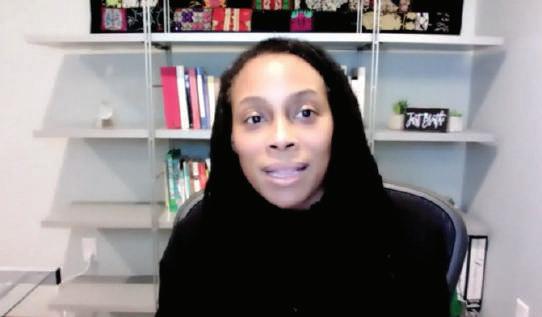
Marcella Nunez-Smith, MD, MHS, described the need for equity in vaccination efforts to fight COVID-19.






